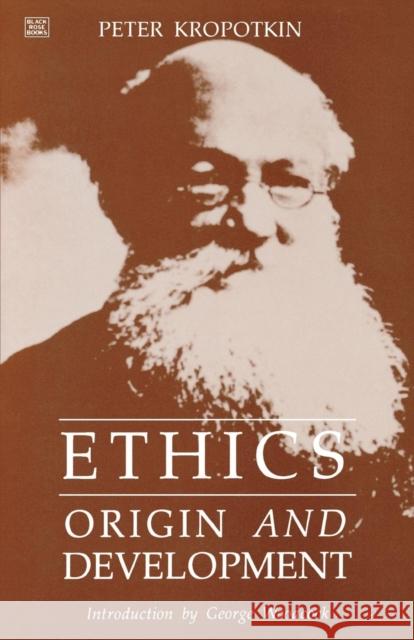Ethics: Origins and Development » książka
Ethics: Origins and Development
ISBN-13: 9781895431360 / Angielski / Miękka / 1993 / 349 str.
Ethics: Origins and Development
ISBN-13: 9781895431360 / Angielski / Miękka / 1993 / 349 str.
(netto: 92,91 VAT: 5%)
Najniższa cena z 30 dni: 96,76
ok. 22 dni roboczych.
Darmowa dostawa!
Ethics is the swan song of the great humanitarian scientist and anarchist, Peter Kropotkin. It constitutes, as it were, the crowning work and the resume of all his scientific, philosophical, and sociological views, at which he arrived in the course of his long and unusually rich life. Starting with the moral principle in nature, to the moral conceptions of primitive peoples, Kropotkin traces the development of moral teachings from Ancient Greece, Christianity and the Middle Ages, through to the 19th century philosophers. In this way, Ethics gives answers to two fundamental problems of morality: its origin and historical development, and its goals and standards. A realist and a revolutionist, Kropotkin regarded ethics not as an abstract science of human conduct, but as a concrete scientific discipline, whose object it was to inspire people in their practical activities. According to his theory, mutual aid, justice and self-sacrifice are the three elements of morality and these elements lie at the basis of human ethics. He held that ethics should be one and the same for all people - that no matter what class or party one might belong, we were all, first of all, human beings. In his introduction, George Woodcock, a great humanitarian in his own right, describes the background from out of which Kropotkin was moved to write this unforgettable work. He introduces the reader, not only to the political and social climate, but also to the man and his innermost concerns. Ethics is the 8th volume of The Collected Works of Peter Kropotkin, published by Black Rose Books. Table of Contents Introduction by George Woodcock Translators Preface Introduction by the Russian Editor Chapter I: The Present Need for Determining the Bases of Morality Chapter II: The Gradually Evolving Bases of the New Ethics Chapter III: The Moral Principle in Nature Chapter IV: Moral Conventions of Primitive People Chapter V: Development of Moral Teaching - Ancient Greece Chapter VI: Christianity - The Middle Ages - The Renaissance Chapter VII: Development of Moral Teachings in the Modern Era - 17th and 18th Centuries Chapter VIII: Development of Moral Teachings in the Modern Era - 17th and 18th Centuries Continued Chapter IX: Development of Moral Teachings in the Modern Era - End of the 18th Century and Beginning of the 19th Century Chapter X: Development of Moral Teachings - the 19th Century Chapter XI: Development of Moral Teachings - the 19th Century Continued Chapter XII: Development of Moral Teachings - the 19th Century Continued Chapter XIII: Development of Moral Teachings - the 19th Century Concluded Conclusion 1993: 349 pages, index Paperback ISBN: 978-1-895431-36-0 Hardcover ISBN: 978-1-895431-37-7 ISSN: 1188-5807
Ethics is the swan song of the great humanitarian scientist and anarchist, Peter Kropotkin. It constitutes, as it were, the crowning work and the resume of all his scientific, philosophical, and sociological views, at which he arrived in the course of his long and unusually rich life.Starting with the moral principle in nature, to the moral conceptions of primitive peoples, Kropotkin traces the development of moral teachings from Ancient Greece, Christianity and the Middle Ages, through to the 19th century philosophers. In this way, Ethics gives answers to two fundamental problems of morality: its origin and historical development, and its goals and standards.A realist and a revolutionist, Kropotkin regarded ethics not as an abstract science of human conduct, but as a concrete scientific discipline, whose object it was to inspire people in their practical activities. According to his theory, mutual aid, justice and self-sacrifice are the three elements of morality and these elements lie at the basis of human ethics. He held that ethics should be one and the same for all people - that no matter what class or party one might belong, we were all, first of all, human beings.In his introduction, George Woodcock, a great humanitarian in his own right, describes the background from out of which Kropotkin was moved to write this unforgettable work. He introduces the reader, not only to the political and social climate, but also to the man and his innermost concerns.Ethics is the 8th volume of The Collected Works of Peter Kropotkin, published by Black Rose Books.Table of ContentsIntroduction by George WoodcockTranslators PrefaceIntroduction by the Russian EditorChapter I: The Present Need for Determining the Bases of Morality Chapter II: The Gradually Evolving Bases of the New EthicsChapter III: The Moral Principle in NatureChapter IV: Moral Conventions of Primitive PeopleChapter V: Development of Moral Teaching - Ancient GreeceChapter VI: Christianity - The Middle Ages - The RenaissanceChapter VII: Development of Moral Teachings in the Modern Era - 17th and 18th CenturiesChapter VIII: Development of Moral Teachings in the Modern Era - 17th and 18th Centuries ContinuedChapter IX: Development of Moral Teachings in the Modern Era - End of the 18th Century and Beginning of the 19th CenturyChapter X: Development of Moral Teachings - the 19th CenturyChapter XI: Development of Moral Teachings - the 19th Century ContinuedChapter XII: Development of Moral Teachings - the 19th Century ContinuedChapter XIII: Development of Moral Teachings - the 19th Century ConcludedConclusion 1993: 349 pages, index Paperback ISBN: 978-1-895431-36-0Hardcover ISBN: 978-1-895431-37-7ISSN: 1188-5807











